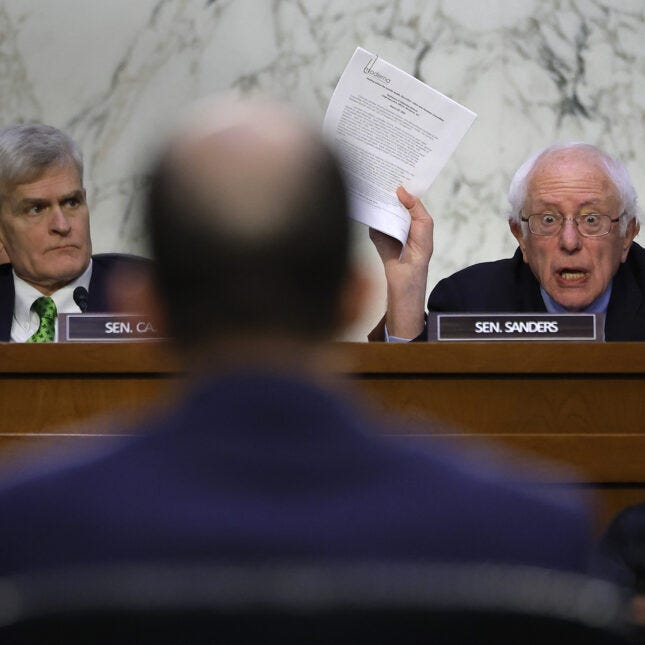PBMs under a microscope in the Senate
Plus: What a US default means for Medicare payments
Good morning and happy Friday. You’re reading the Friday Pulse Check from FLATLINING.net and Fulcrum Strategies.
In the news:
Bi-partisan legislation in HELP Committee goes after PBMs
It is a rare day in Washington when independent Vermont Senator Bernie Sanders and Republican Louisiana Senator Bill Cassidy are on the same page. That seems to be the case with the renewed attention that pharmacy benefit managers are receiving in Senate Health, Education, Labor, and Pensions Committee. I suggested earlier this year that this may become the focus of the HELP Committee because Sen. Sanders is aware that he cannot get his Medicare for All proposals passed and that PBMs were going to start ratcheting up the “good press” they need in Washington. The specifics of the plan are still in the working stages, but it appears that the government wants to rein in the high profits of PBMs that drive up the out-of-pocket cost of prescription drugs for patients and make sure that the rebates that big pharma offers make it to the patients’ pockets rather than the PBMs.’ Read more in KFF Health News.
New recommendations for mammogram screenings
The US Preventative Services Task Force recommended changing the age guidelines for women to receive mammogram breast cancer screenings this week. The recommended change lowers the age from fifty to forty. Many healthcare organizations were already recommending and performing breast cancer screenings for women in their forties. The American Cancer Society recommends they begin at age forty-five. Read more in the Charlotte Observer via Yahoo! News.
Just how much work has CMS done on hospital price transparency enforcement? Basically none.
Last week, it was made public that two hospitals had received fines from the Centers for Medicare and Medicaid Services for failing to adhere to the price transparency laws that were enacted during the Trump administration. I recalled that Health and Human Services Secretary Xavier Beccera had said in an interview that they had sent hundreds of warnings, but no fines. Here are some helpful stats for context on this issue:
CMS warnings sent: 730
Corrective action plans requested: 269
Fines issued: 4
Northside Hospital Atlanta was fined $883,180 in June 2022.
Northside Hospital Cherokee in Canton, Georgia was fined $214,320 in June 2022.
Kell West Regional Hospital in Wichita Falls, Texas, was fined $117,260 in April. This hospital plans to appeal.
Frisbie Memorial Hospital in Rochester, New Hampshire, was fined $102,660 in April. This hospital claims they were never contacted by CMS.
Other articles of interest:
Study: Ozempic may help produce cancer-fighting cells - The New York Post
(NVO 0.00%↑)
Unregulated and very potent legal marijuana - USA Today
The FLATLINING Podcast
This week on the podcast, Ron and I discussed the debt ceiling again and how it could impact physicians, particularly when it comes to Medicare reimbursement. There is a possibility that if US hits the debt ceiling, the federal government could opt to pay its debts rather than spend on entitlement programs such as Social Security and Medicare.
In that event, the federal government could stop paying Medicare claims for a while. While I suspect the possibility of this of happening is slim, it is still a possibility.
Ron and I discussed what physicians and medical practices should do in the event that happens. Some may have to consider not seeing new Medicare patients who have the red, white, and blue card and not a Medicare Advantage plan.
Relatedly, former President Donald Trump participated in a CNN Townhall on Wednesday night. He was asked about the debt ceiling and said that if the US hits it might not be consequential but just a “bad week or a bad day.” I don’t know of many economists who would agree with that. You can watch the clip below:
Subscribe to the FLATLINING Podcast on Apple Podcasts, Spotify, the iHeartRadio app, Amazon Music, Google Podcasts, Stitcher, Pandora, TuneIn, and Audible.
Ukraine
With the World Health Organization ending the global health emergency for COVID-19, a Ukrainian health minister is warning that some countries are not out of the woods yet. He reported that over one hundred thousand people have died of COVID-19 in his country. Read more from Ukrinform.
Final Thought
As I shared with several friends this week, I have been watching the Carolina Hurricanes in the NHL playoffs on Canadian television because it is available over the air where I live and I’m too cheap for cable. Following Carolina’s crushing 6-1 blow to New Jersey on Tuesday night, I caught CBC News’ The National and was very interested by a story on a new development to treat Parkinson’s disease.
One of the CBC News anchors had been diagnosed with the disease some years ago and had recently received a deep brain implant that emits electric signals into his brain controlled by a remote and his cell phone. As a result, he says he has to rely much less on prescription medication and his doctors say he has another ten to fifteen years with minimal tremors.
Watch on CBC News’ The National:
Have a good weekend everyone.
Matthew





